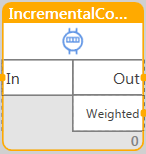Table of Contents
Counter with Overflow Protection
Full Name
Lib.Mervis.v1_0.IncrementalCounter
Required Project References
- Lib.Mervis
Description
A helper block used for handling counter inputs that are at risk of overflow.
Usage in ST
program test
var
inp: lib.mervis.v1_0.IncrementalCounter;
end_var
inp();
end_program
Inputs
| Name | Data Type | Retain | Mandatory Connection | Meaning |
| In | udint | No | Yes | Counter input value |
| Set | bool | No | No | Counter reset |
| Overflow | udint | No | No | Maximum counter input value for overflow handling (if =0, not used) |
| Step | udint | No | No | |
| PulseWeight | real | No | No | Pulse weight, used to convert the counter value to a physical value |
| Offset | real | No | No | Pulse count offset, used to convert the counter value to a physical value |
Outputs
| Name | Data Type | Meaning |
| Out | udint | Output |
| Weighted | real | Output converted to a physical value using PulseWeight and Offset |
| OverflowFlag | bool | Overflow flag |
| OverflowCount | udint | Counter overflow count |
Detailed Function Description
The block is used to handle the value from a counter that frequently overflows. The block contains an internal 32-bit counter, which always increments by the number of incoming pulses (the difference from the previous computation cycle). If this difference is negative, it is considered an overflow, and the behavior depends on the Overflow parameter:
- Overflow = 0 → the change is ignored, and the internal counter state does not change.
- Overflow > 0 → the counter has overflowed, the difference Overflow - Penultimate input value and also the current counter state is added to the internal state.
The Weighted output is calculated as a linear transformation of the internal counter state, i.e., Weighted = PulseWeight * Out + Offset
